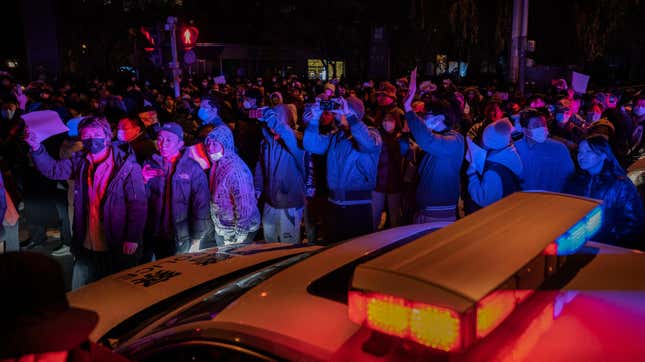
As unrest in China against covid-19 curbs reaches a fever pitch, the chorus calling for Chinese president Xi Jinping to resign is growing, leading to what observers have dubbed the largest demonstrations in the country since Tiananmen Square in 1989.
Following the protests at Apple’s supplier Foxconn’s Zhengzhou plant last week, new sparks for unrest in a country where residents have been subjected to arbitrary and sudden restrictions for the past two years lit up in various areas. Triggered by an apartment fire in Urumqi that resulted in 10 deaths last, protests broke out across Wuhan, Chengdu, and parts of the capital Beijing over the weekend. Hundreds of protesters clashed with police in Shanghai.
The ripples are being felt across the board. The mix of protests and covid curbs threaten to further slow economic activity and suppress demand for energy, food, and raw materials.
Today (Nov. 28), oil prices tumbled to their lowest in 2022 amid tepid demand from the world’s largest crude oil importer. The yuan hit a two-week low. The country’s stock markets, which were already struggling amid Jinping’s attempts to consolidate power, sank. Commodities—which surge when curbs are eased—saw their prices drop after a broad selloff.
Charted: What’s causing oil prices to tumble
Stocks and commodities sink, by the digits
4%: How much Hong Kong’s Hang Sha Index sank today (Nov. 28), before paring losses. It ended 1.6% down. The Shanghai Stock Exchange, Australia-based S&P’s Asia Index, Kospi in South Korea, and Japan’s Nikkei also felt the hit
1.8%: Decline in Chinese copper futures
3%: Cooking oil futures in Dalian tumbled on concerns over the threat to demand at restaurants and hotels, which are already struggling
3%: Industrial profits down year-on-year in the first 10 months of the year
What’s happening with iPhone production now?
Apple has been trying to wean itself off a total reliance on China. It started producing the iPhone 14 in India way earlier than it typically does (but just the basic version; not the Pro or Pro Max versions). It’s also been boosting production in Vietnam. But catching up to the world’s factory is a slow and arduous process.
Majority of the Cupertino phone maker’s handsets are still made in China. Unrest at Foxconn’s factory in Zhengzhou—the “iPhone City” that counts over 200,000 workers—will hit 30% of supply. Desperate to retain the staff, the facility is offering $1,800 bonuses.
The higher-end versions—the iPhone 14 Pro and Pro max—are exclusively produced in Zhengzhou. “That suggests to me that the higher-end iPhones have a different set of production processes, which is not very easy to be transferred elsewhere,” Martin Yang, senior analyst of emerging technologies of investment firm Oppenheimer, told CNBC’s Street Signs Asia. “And oftentimes that refers to very custom equipment and a trained workforce that are not readily available elsewhere.”
Can China recover?
If China continues to tighten its grip on its people and its commerce, investors will likely turn more risk averse.
Listening to the demonstrators’ demands could help Chinese economy’s stewards decide next steps, offering more clarity and assurance.
“Protests could also be the catalyst that leads to a positive outcome in leading the government to set a clearer game plan on how the country is going to learn to live with covid, setting a more transparent timetable, and accelerating China’s move to living with covid,” Robert Subbaraman, chief economist at Japan’s financial services group Nomura, told Reuters.
Related stories
🚫 Apple hobbled a crucial tool of dissent in China weeks before widespread protests broke out
🇨🇳 Unusually bold public dissent comes before Xi Jinping’s pivotal Party Congress meeting